人教版(2019)必修 第一册Unit 3 Sports and fitness Listening and Talking优秀课件(共11张PPT)
文档属性
| 名称 | 人教版(2019)必修 第一册Unit 3 Sports and fitness Listening and Talking优秀课件(共11张PPT) | 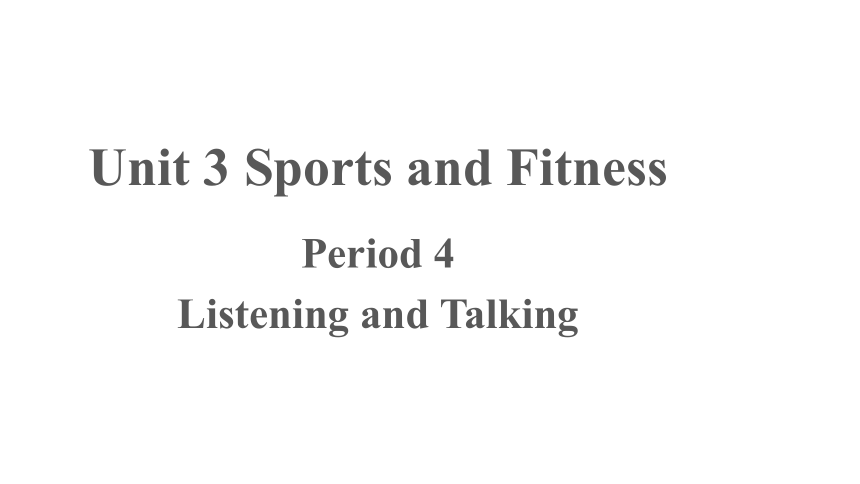 | |
| 格式 | pptx | ||
| 文件大小 | 3.0MB | ||
| 资源类型 | 教案 | ||
| 版本资源 | 人教版(2019) | ||
| 科目 | 英语 | ||
| 更新时间 | 2024-04-01 20:27:00 | ||
图片预览

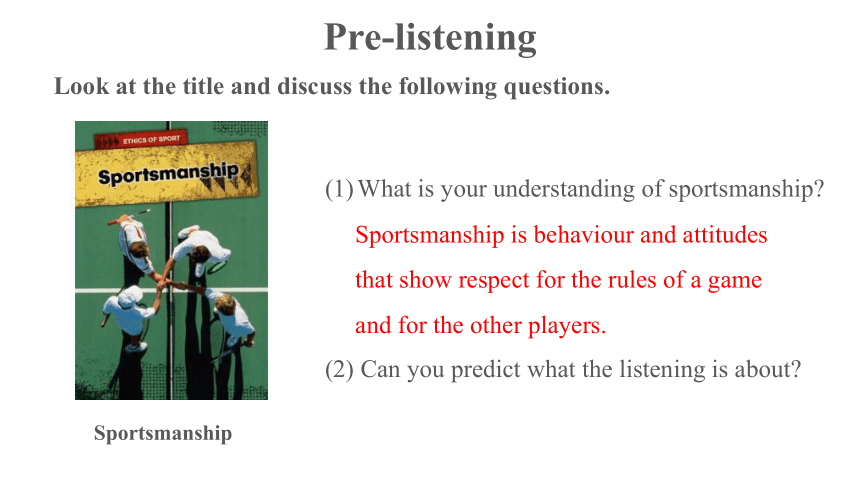
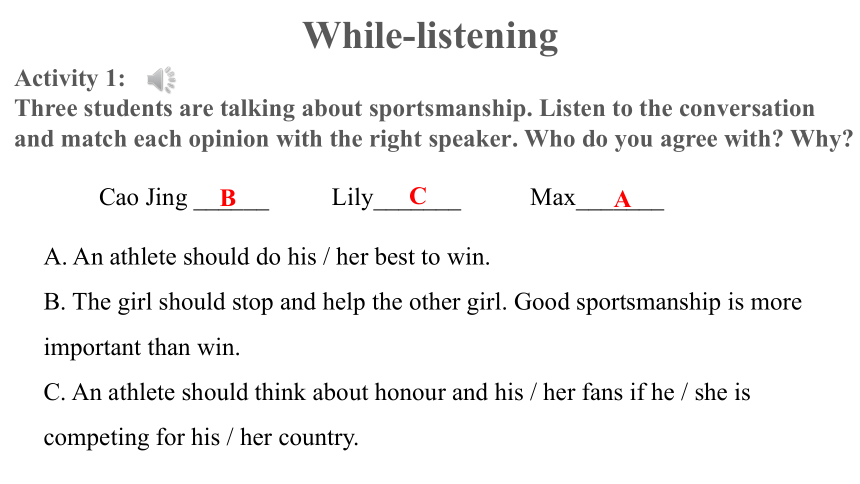
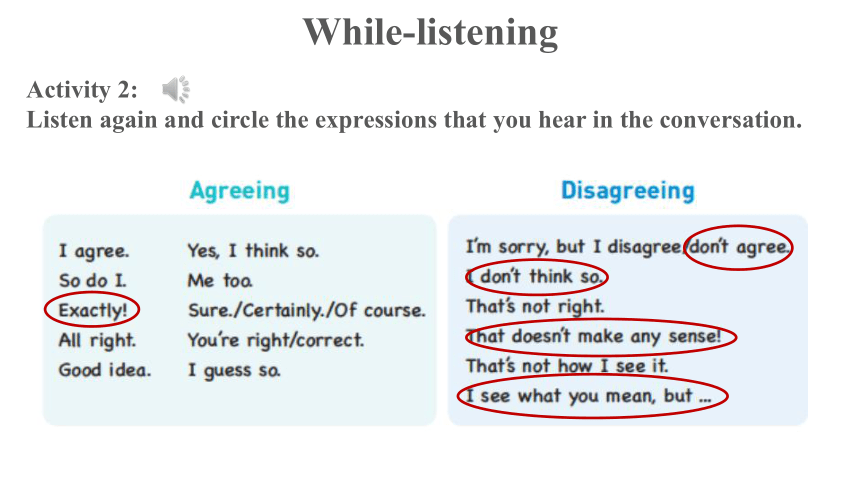
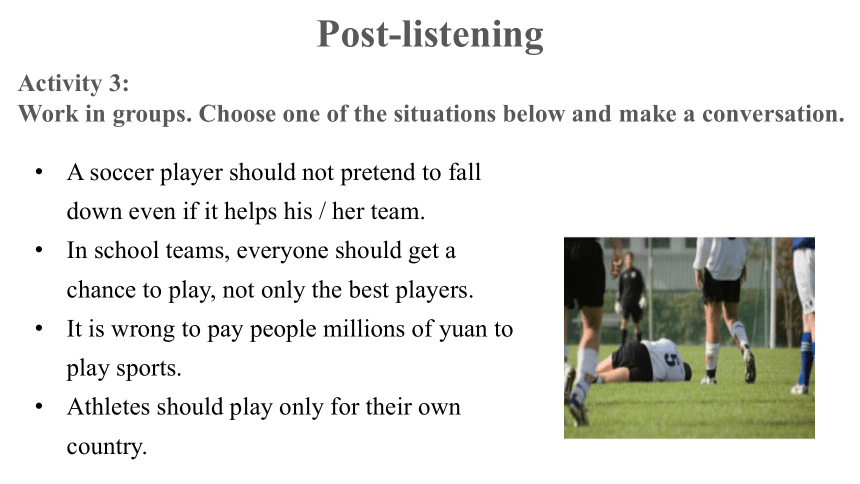
文档简介
(共11张PPT)
Unit 3 Sports and Fitness
Period 4
Listening and Talking
What is your understanding of sportsmanship
(2) Can you predict what the listening is about
Sportsmanship
Look at the title and discuss the following questions.
Sportsmanship is behaviour and attitudes that show respect for the rules of a game and for the other players.
Pre-listening
While-listening
Activity 1:
Three students are talking about sportsmanship. Listen to the conversation and match each opinion with the right speaker. Who do you agree with Why
Cao Jing ______ Lily_______ Max_______
A. An athlete should do his / her best to win.
B. The girl should stop and help the other girl. Good sportsmanship is more important than win.
C. An athlete should think about honour and his / her fans if he / she is competing for his / her country.
A
B
C
While-listening
Activity 2:
Listen again and circle the expressions that you hear in the conversation.
Post-listening
Activity 3:
Work in groups. Choose one of the situations below and make a conversation.
A soccer player should not pretend to fall down even if it helps his / her team.
In school teams, everyone should get a chance to play, not only the best players.
It is wrong to pay people millions of yuan to play sports.
Athletes should play only for their own country.
Post-listening
Proposition Reasons for agreement Reasons for disagreement
A soccer player should not pretend to fall down even if it helps his / her team . honesty is more important; people care about fair play; … winning is more important; good for the team;
…
In school teams, everyone should get a chance to play, not only the best players. equal chance is important; spread the spirit of sports; … important thing is to win;
best player can help win;
…
It is wrong to pay people millions of yuan to play sports. spoil spirit of sports; might cheat to win; … motivate athletes;
attract talented people;
…
Athletes should play only for their own country. set an example of loving one’s own country; get more support; … not beneficial for personal growth;
not good for competition;
…
Add more reasons as the following ones in the table.
在日常对话中,对对方的观点,我们常常会表示同意或不同意。在英语中,常用的表示同意和不同意的表达有:
Agreeing:
I agree.
Yes, I think so.
So do I.
Me too.
Exactly! Sure./Certainly./Of course.
All right. You’re right/correct.
Good idea. I guess so.
Disagreeing:
I’m sorry, but I disagree/don’t agree.
I don’t think so.
That’s not right.
That doesn’t make any sense!
That’s not how I see it.
I see what you mean, but …
I’m afraid not.
Post-listening
有些表达语气较委婉,
或不太确定、无所谓:
Go ahead.
It’s up to you.
If that’s all right with you.
I’d rather you didn’t.
Nope. (比较随意的说法)
Certainly not.
Not for any reason.
No way!
Not a chance.
还有些表达语气比较生硬,要注意使用的场合:
Post-listening
Post-listening
Sample Conversation
A: It is wrong to pay people millions of yuan for playing sports.
B: I agree. Sports are only sports. Doctors and teachers should get more money, because their jobs are more important.
C: That’s not how I see it. Sports stars get paid a lot because they also help sell things…
Assignment
Do a survey in your class about what their understanding of sportsmanship is. Then write it down.
Goodbye!
Unit 3 Sports and Fitness
Period 4
Listening and Talking
What is your understanding of sportsmanship
(2) Can you predict what the listening is about
Sportsmanship
Look at the title and discuss the following questions.
Sportsmanship is behaviour and attitudes that show respect for the rules of a game and for the other players.
Pre-listening
While-listening
Activity 1:
Three students are talking about sportsmanship. Listen to the conversation and match each opinion with the right speaker. Who do you agree with Why
Cao Jing ______ Lily_______ Max_______
A. An athlete should do his / her best to win.
B. The girl should stop and help the other girl. Good sportsmanship is more important than win.
C. An athlete should think about honour and his / her fans if he / she is competing for his / her country.
A
B
C
While-listening
Activity 2:
Listen again and circle the expressions that you hear in the conversation.
Post-listening
Activity 3:
Work in groups. Choose one of the situations below and make a conversation.
A soccer player should not pretend to fall down even if it helps his / her team.
In school teams, everyone should get a chance to play, not only the best players.
It is wrong to pay people millions of yuan to play sports.
Athletes should play only for their own country.
Post-listening
Proposition Reasons for agreement Reasons for disagreement
A soccer player should not pretend to fall down even if it helps his / her team . honesty is more important; people care about fair play; … winning is more important; good for the team;
…
In school teams, everyone should get a chance to play, not only the best players. equal chance is important; spread the spirit of sports; … important thing is to win;
best player can help win;
…
It is wrong to pay people millions of yuan to play sports. spoil spirit of sports; might cheat to win; … motivate athletes;
attract talented people;
…
Athletes should play only for their own country. set an example of loving one’s own country; get more support; … not beneficial for personal growth;
not good for competition;
…
Add more reasons as the following ones in the table.
在日常对话中,对对方的观点,我们常常会表示同意或不同意。在英语中,常用的表示同意和不同意的表达有:
Agreeing:
I agree.
Yes, I think so.
So do I.
Me too.
Exactly! Sure./Certainly./Of course.
All right. You’re right/correct.
Good idea. I guess so.
Disagreeing:
I’m sorry, but I disagree/don’t agree.
I don’t think so.
That’s not right.
That doesn’t make any sense!
That’s not how I see it.
I see what you mean, but …
I’m afraid not.
Post-listening
有些表达语气较委婉,
或不太确定、无所谓:
Go ahead.
It’s up to you.
If that’s all right with you.
I’d rather you didn’t.
Nope. (比较随意的说法)
Certainly not.
Not for any reason.
No way!
Not a chance.
还有些表达语气比较生硬,要注意使用的场合:
Post-listening
Post-listening
Sample Conversation
A: It is wrong to pay people millions of yuan for playing sports.
B: I agree. Sports are only sports. Doctors and teachers should get more money, because their jobs are more important.
C: That’s not how I see it. Sports stars get paid a lot because they also help sell things…
Assignment
Do a survey in your class about what their understanding of sportsmanship is. Then write it down.
Goodbye!
